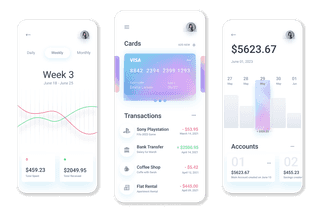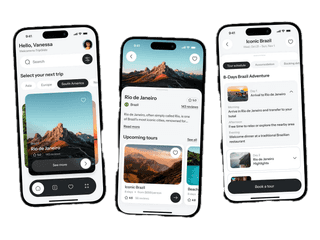Mobile App Development
Mobile technology plays a significant role in how we interact digitally with each other today. We understand the challenges of remaining up to date with the latest trends, particularly in the area of mobile technology. However, failing to integrate mobile into your strategy could result in a loss of competitive advantage.
Mobile app development is the process of creating software for mobile devices, including smartphones and tablets. As mobile technology continues to grow and evolve, businesses require custom apps that meet their unique needs. To ensure a successful development project, it is crucial to have experts who possess in-depth knowledge of iOS, Android, and hybrid technologies.

The advantages of having a mobile app include:
- Mobile apps provide businesses with a direct and personalized communication channel, enabling deeper customer relationships. Features such as push notifications, in-app messaging, and loyalty programs allow businesses to keep users informed, offer personalized content, and reward repeat interactions, which significantly boosts customer loyalty and engagement.
- Mobile apps are designed to run natively on a user’s device, which often results in faster load times and smoother performance compared to web apps. This enhanced performance improves user satisfaction, as users are more likely to enjoy and return to an app that operates quickly and efficiently. This, in turn, can lead to higher levels of engagement and retention.
- One of the key advantages of mobile apps is their ability to function without an internet connection. This means that users can access important features, content, and services even when they’re offline, making the app more reliable and user-friendly. Offline functionality is particularly valuable for apps used in areas with limited connectivity
- Mobile apps have direct access to a device's hardware, such as the camera, GPS, microphone, and sensors. This access allows apps to offer advanced functionalities that web apps cannot match. For example, fitness apps can track physical activity using accelerometers, while photo editing apps can leverage high-quality camera functions.
Is a mobile app the optimal digital tool for your business?
Mobile apps offer many benefits, but it's essential to ensure they fit your business needs. Consider your target audience and their device preferences. Assess if a mobile app simplifies the customer journey or complicates it. Lastly, evaluate your functionality requirements, like offline features for games or tools.
Choosing between a web app and a mobile app depends on your needs. Web apps work on any device with a browser, don't require downloading, and are easy to update. Mobile apps need installation but offer better performance, offline access, and personalized experiences. They also provide greater control over hardware like cameras and sensors, making them ideal for fitness or photo apps.

Get Expert Consultation
If you are still undecided as to whether your business requires a mobile application or a web application, our team can assist. Our comprehensive consultation service will assess your requirements, guiding you towards the optimal solution for your business.
Contact us